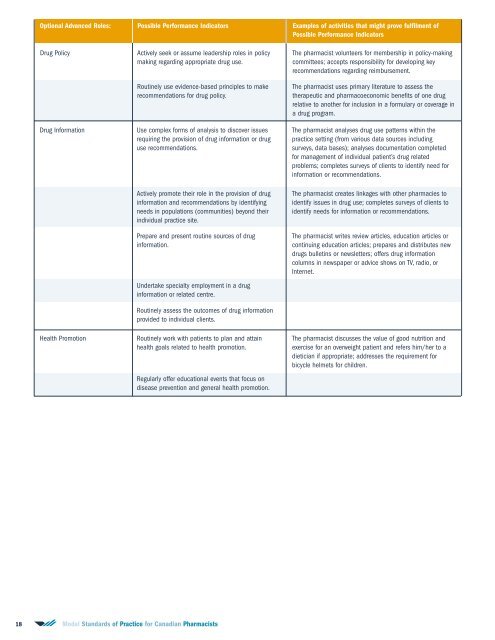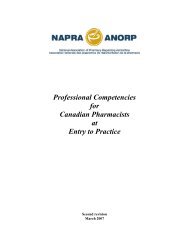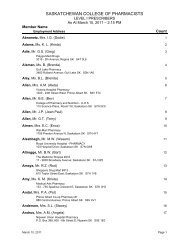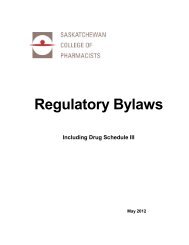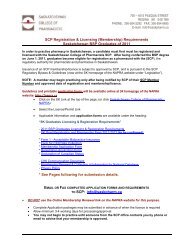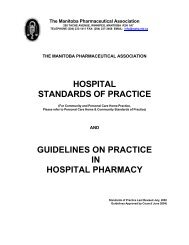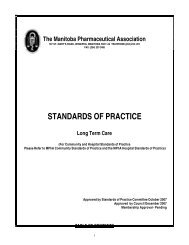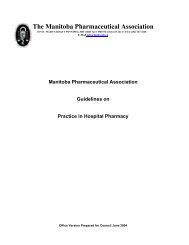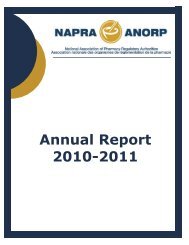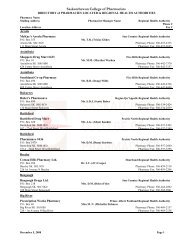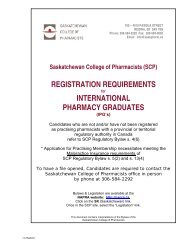Professional Competency #2: Provide Drug Information - NAPRA
Professional Competency #2: Provide Drug Information - NAPRA
Professional Competency #2: Provide Drug Information - NAPRA
Create successful ePaper yourself
Turn your PDF publications into a flip-book with our unique Google optimized e-Paper software.
Optional Advanced Roles: Possible Performance Indicators Examples of activities that might prove fulfilment of<br />
Possible Performance Indicators<br />
<strong>Drug</strong> Policy<br />
Actively seek or assume leadership roles in policy<br />
making regarding appropriate drug use.<br />
Routinely use evidence-based principles to make<br />
recommendations for drug policy.<br />
<strong>Drug</strong> <strong>Information</strong> Use complex forms of analysis to discover issues<br />
requiring the provision of drug information or drug<br />
use recommendations.<br />
Actively promote their role in the provision of drug<br />
information and recommendations by identifying<br />
needs in populations (communities) beyond their<br />
individual practice site.<br />
Prepare and present routine sources of drug<br />
information.<br />
Undertake specialty employment in a drug<br />
information or related centre.<br />
Routinely assess the outcomes of drug information<br />
provided to individual clients.<br />
Health Promotion Routinely work with patients to plan and attain<br />
health goals related to health promotion.<br />
Regularly offer educational events that focus on<br />
disease prevention and general health promotion.<br />
18 Model Standards of Practice for Canadian Pharmacists<br />
The pharmacist volunteers for membership in policy-making<br />
committees; accepts responsibility for developing key<br />
recommendations regarding reimbursement.<br />
The pharmacist uses primary literature to assess the<br />
therapeutic and pharmacoeconomic benefits of one drug<br />
relative to another for inclusion in a formulary or coverage in<br />
a drug program.<br />
The pharmacist analyses drug use patterns within the<br />
practice setting (from various data sources including<br />
surveys, data bases); analyses documentation completed<br />
for management of individual patient’s drug related<br />
problems; completes surveys of clients to identify need for<br />
information or recommendations.<br />
The pharmacist creates linkages with other pharmacies to<br />
identify issues in drug use; completes surveys of clients to<br />
identify needs for information or recommendations.<br />
The pharmacist writes review articles, education articles or<br />
continuing education articles; prepares and distributes new<br />
drugs bulletins or newsletters; offers drug information<br />
columns in newspaper or advice shows on TV, radio, or<br />
Internet.<br />
The pharmacist discusses the value of good nutrition and<br />
exercise for an overweight patient and refers him/her to a<br />
dietician if appropriate; addresses the requirement for<br />
bicycle helmets for children.


